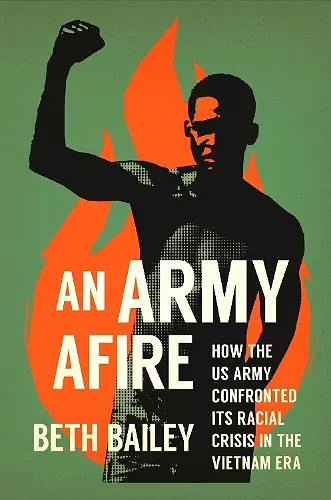An Army Afire
How the US Army Confronted Its Racial Crisis in the Vietnam Era
Format:Hardback
Publisher:The University of North Carolina Press
Published:31st May '23
Currently unavailable, our supplier has not provided us a restock date

By the Tet Offensive in early 1968, what had been widely heralded as the best qualified, best-trained army in US history was descending into crisis as the Vietnam War raged without end. Morale was tanking. AWOL rates were rising. And in August of that year, a group of Black soldiers seized control of the infamous Long Binh Jail, burned buildings, and beat a white inmate to death with a shovel. The days of "same mud, same blood" were over, and by the end of the decade, a new generation of Black GIs had decisively rejected the slights and institutional racism their forefathers had endured.
Acclaimed military historian Beth Bailey shows how the Army experienced, defined, and tried to solve racism and racial tension (in its own words, "the problem of race") in the Vietnam War era. Some individuals were sympathetic to the problem but offered solutions that were more performative than transformational, while others proposed remedies that were antithetical to the army's fundamental principles of discipline, order, hierarchy, and authority. Bailey traces a frustrating yet fascinating arc where the army initially rushed to create solutions without taking the time to fully identify the origins, causes, and proliferation of racial tension. It was a difficult, messy process, but only after Army leaders ceased viewing the issue as a Black issue and accepted their own roles in contributing to the problem did change become possible.
A detailed examination of the U.S. Army's efforts to address "the problem of race" in the late 1960s and early '70s . . . . [Bailey's] in-depth reporting on the Army's attempts to "assess and address Black soldiers' complaints" sheds light on what was accomplished, as well as how far there is left to go. It's a valuable study of the challenges to institutional reform."—Publishers Weekly
Bailey's account of the way the army responded to the growing crisis is original and informative."—Eric Foner, London Review of Books
Bailey has done a great service by exploring the military side of the "racial crisis" of the 1960s and '70s, a topic that has been underexplored by historians . . . . insightful."—Randal Maurice Jelks, Los Angeles Review of Books
ISBN: 9781469673264
Dimensions: unknown
Weight: 317g
360 pages